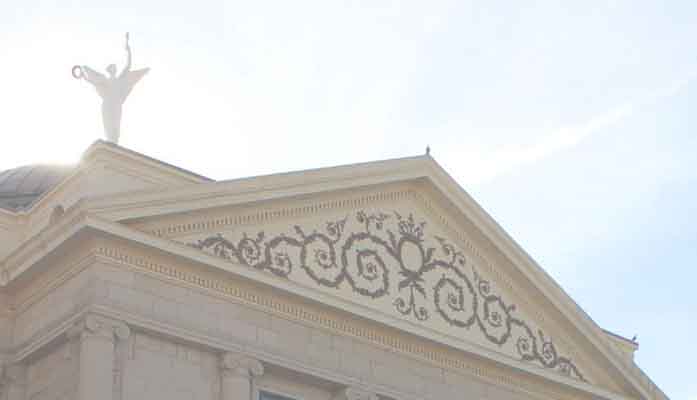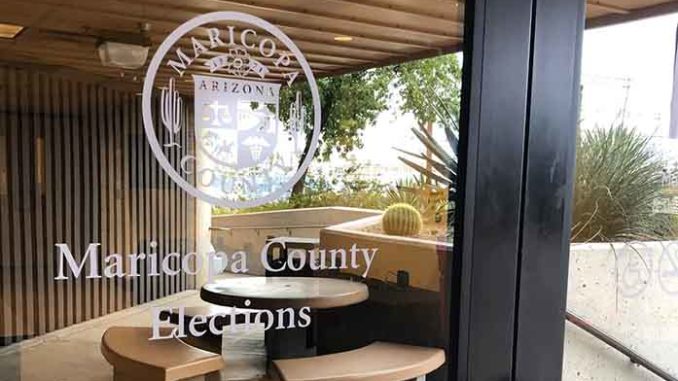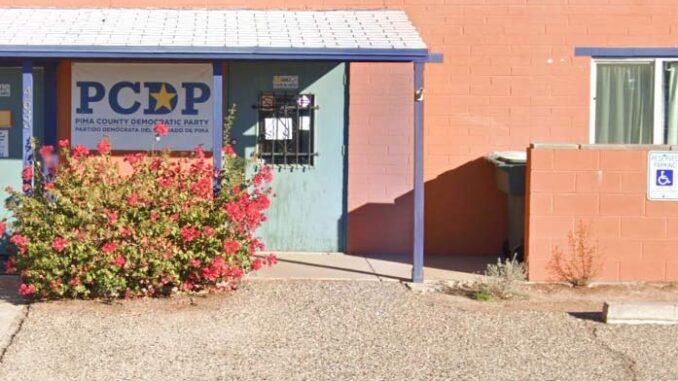
by AZ Free News | Jul 16, 2021 | Economy, News
Governor Doug Ducey this week announced $101.1 million in federal American Rescue Plan funding to launch the Visit Arizona Initiative, a bold program designed to increase visitation and tourism spending in Arizona, bolster job creation and accelerate economic recovery.
“Tourism is essential for Arizona’s booming economy and job growth,” said Governor Ducey. “When visitors from across the globe travel to our great state, they stay in our hotels, eat at our restaurants, buy our products and enjoy our recreational activities. Their investments benefit Arizonans, and the Visit Arizona Initiative will help our tourism sector prosper — and continue to recover from the effects of the pandemic. My thanks goes to Arizona Office of Tourism Director Debbie Johnson for her dedication to growing tourism throughout the state and supporting Arizonans employed by the travel industry.”
As it did globally, the tourism industry in Arizona endured losses in visitation, visitor spending, tourism tax revenue and employment during the COVID-19 pandemic. The use of federal American Rescue Plan money will assist communities across the state in recovery through tourism marketing, event and attraction support, and outdoor recreation revitalization.
Arizona’s 2020 overnight visitation decreased by 31 percent and visitor spending decreased by 41 percent compared to 2019 numbers, according to recent data. But with this investment and the effectiveness of Arizona’s visitor marketing, Arizona will stay top of mind for travelers.
“Thousands of Arizonans who work in the tourism industry were displaced due to the pandemic. Now that our economy is strong, jobs are readily available and visitors are coming to our beautiful state, we are making sure employment opportunities continue to grow for hard workers across Arizona,” the Governor said.
The Visit Arizona Initiative includes marketing funding for destination marketing organizations (DMOs) statewide, reinvigorating local community programs and events, and marketing support for domestic and international flights and outdoor recreation.
“We are grateful for the investment Governor Ducey is making in our state’s tourism industry, which contributes to the economic vitality of communities and people all across Arizona,” said Debbie Johnson, director of the Arizona Office of Tourism.
The new funding is being warmly received by officials in communities all across Arizona where tourism is an important part of the economy.
“Arizona is a world-class destination and is ready to welcome visitors from around the world to explore our great state. The tourism recovery fund is an investment in a vital economic driver and will benefit all areas of the state,” said Cal Sheehy, Mayor of Lake Havasu City. “We applaud Governor Ducey’s commitment to the tourism economy statewide.”
The Initiative also provides funding to the Arizona State Parks & Trails for park revitalization and improvement, legacy golf course revitalization, the Arizona State Fair for marketing, the Arizona Lodging & Tourism Association for a workforce initiative and Local First for rural destination development.
“COVID-19 had multiple impacts on our state’s destinations,” said Bill Nassikas, President & COO of Westroc Hospitality. “This funding comes at a crucial time of our recovery, as we reinvigorate Arizona’s tourism economy and welcome back visitors to our great state. Governor Ducey’s forethought will help keep Arizona tourism competitive on the national stage.”
AOT, along with statewide tourism stakeholders, continues to promote visitation and support industry recovery across Arizona. These efforts include visitor marketing campaigns, supporting industry partners and communities with strategic recovery planning and promoting sustainable and responsible tourism. The new Visit Arizona Initiative will ensure these programs continue and grow to meet the needs of the industry.

by Corinne Murdock | Jul 16, 2021 | News
By Corinne Murdock |
On Thursday, the Arizona Senate held a hearing on the election audit as it heads into its final days of work. Election auditors testified that they discovered a sweeping variety of discrepancies within the election proceedings, including: ballot numbers and quality, voter rolls, cybersecurity, and signature matching processes. Additionally, the auditors reported that they were still lacking the chain of custody logs and routers, which were included within the Senate’s subpoena. The three audit officials testifying were Senate Liaison Ken Bennett, Cyber Ninjas CEO Doug Logan, and CyFIR founder Ben Cotton.
Among their findings from over 80,000 hours of work, the auditors testified that they discovered a surplus of over 74,000 mail-in ballots received and counted than were mailed out, 4,000 individuals were registered to vote after the October 15 deadline, over 11,000 voters disappeared from the rolls after the election but reappeared a month later, over 17,000 voters were removed from the voter rolls after the election, thousands of duplicate ballots lacked a serial number, most ballots were vulnerable to over-voting or unintended voting due to being printed out of calibration, election security systems on the machines weren’t updated after 2019, and a sizeable number of ballots were discovered with bleed-throughs.
Notably, only 52 out of around 1,700 boxes of election materials were reportedly secured with tamper-evident tape. The remainder were secured with regular packing tape. Logan assured the Senate that they would return these boxes numbered with new seals of tamper-evident tape.
Cotton explained that system updates on election machines are crucial for cybersecurity. Without updates, any system may grow increasingly vulnerable to hackers. Since the machines weren’t updated after 2019, hackers had several years to breach the system. This may explain the 38,000 inquiries for blank passwords that the auditors reported discovering.
At least one incident of hacking likely occurred with the Maricopa County election systems in the 2020 election. Federal agents raided the home of an individual named Elliot Kerwin on November 5 over intelligence indicating that he’d breached the systems sometime from October up through Election Day.
Maricopa County claimed that it used ballot paper thick enough to prevent bleed-throughs. However, the auditors said that they discovered the opposite was true. Logan said that anything from ballpoint pens to Sharpies could cause bleed-through.
https://twitter.com/AuditWarRoom/status/1415743378776477697?ref_src=twsrc%5Etfw%7Ctwcamp%5Etweetembed%7Ctwterm%5E1415743378776477697%7Ctwgr%5E%7Ctwcon%5Es1_&ref_url=https%3A%2F%2Farizonasuntimes.com%2F2021%2F07%2F16%2Felection-auditors-report-surplus-of-over-74k-mail-in-ballots-4k-voters-registered-after-deadline-18k-voters-removed-from-rolls-following-election%2F
The SharpieGate debacle concerned this very issue. Although several court cases were filed after voters were unsure whether their Sharpied ballots counted, but ultimately that case was dismissed on jurisdictional grounds.
Senate President Karen Fann (R-Prescott) reminded viewers and the floor that this audit was devoid of political agenda or allegiance to previous President Donald Trump.
When Senate Judiciary Committee Chairman Warren Petersen (R-Gilbert) asked the three men what more they would need to finalize their report. Logan responded that they would need the routers, splunk logs, portable media and external drives, chain of custody documents, the network diagram, election management data backups, records of all papers sent to vote centers, the total of all ballots sent to eligible voters, and a full backup copy of the voter rolls.
He added that they would also need copies of the election policies and procedures, including information on ballot adjudication processes. While those documents are available in part to the public, Logan explained that there were more detailed documents given to election officials and workers that they required.
A day before the hearing, the House Committee on Oversight and Reform submitted a letter to Logan requesting information about their audit process, leadership, interactions, and findings. The request letter listed a number of grievances against Cyber Ninjas’ conduct of the audit, citing multiple times their “lack of election audit experience.”
Congress further cited reporting on the audit to bolster their claims of mismanagement. One citation included a reporter’s indication that blue pens were used during the audit in violation of Arizona election law. That reporter later retracted her claim in part, noting that those pens were during training and cleared from the floor before any live ballots were brought out.
Fann offered a parting thought on the resistance by Maricopa County, as well as Secretary of State Katie Hobbs, to this audit.
“I do not know why Maricopa County has fought this so hard,” remarked Fann.
Corinne Murdock is a contributing reporter for AZ Free News. In her free time, she works on her books and podcasts. Follow her on Twitter, @CorinneMurdock or email tips to corinnejournalist@gmail.com

by Terri Jo Neff | Jul 15, 2021 | News
By Terri Jo Neff |
Included in Arizona’s new $12.8 billion budget are several capital outlay appropriations of more than $163 million for 22 specified highway construction projects, ranging from $46 million to repave State Route 95 in Mohave County and money to $560,000 for improvement to Jerome’s historic Main Street.
Other big ticket projects funded by Senate Bill 1820 for Fiscal Year 2022 are $25 million to construct an overpass at State Route 347 and Riggs Road, $13.6 million to “rehabilitate” pavement along State Route 77 in Oro Valley, $10.6 million to improve State Route 90 near Fort Huachuca in Sierra Vista, and $10 million to improve State Route 95 near the U.S. Army’s Proving Ground in Yuma.
The ADOT appropriations in SB1820 also include $150,000 to study options for expanding the on and off ramps at the intersection of State Route 303 and Grand Avenue in Sun City and $140,000 to study guardrail needs on State Route 377 from Heber to Holbrook.
Being appropriated does not mean a project will be undertaken anytime soon, as land rights may need to be obtained, environmental studies may be needed, and planning phases must be completed.

But while many of the 22 projects specifically funded by SB1820 may not break ground for months, a host of other ADOT construction projects were greenlighted earlier this month when the Arizona Transportation Board announced its Five-Year Program for 2022 to 2026.
Among those projects is the replacement of the Gila River Bridge with a wider set of bridges on Interstate 10 between Phoenix and Casa Grande. The project carries a $83 million price tag with construction set to begin in 2023.
Another Five-Year Program project, at a cost of $328 million, will add traffic lanes on Interstate 17 between Anthem Way and Sunset Point. That project is slated to begin next year, as is a $41 million widening project on U.S. Highway 93 between Tegner Street and Wickenburg Ranch Way. And the first phase of a $70 million construction project for an Interstate 40 / U.S. Highway 93 interchange in western Kingman will start in 2024.
The projects to widen the key Arizona corridors of I-17 and I-10 will be partially funded by the Maricopa Association of Governments.
“The improvements to these Key Commerce Corridors represent two of the most critical transportation priorities in Arizona,” ADOT Director John Halikowski said in response to the Five-Year program. “The additional lanes are important to improve safety and efficiency while the state continues to attract jobs, businesses and economic growth. At the same time, ADOT is investing most rural highway funding to preserve existing roads and bridges to keep them in good condition for the movement of people and freight.”
More than $1 billion collected through gasoline and diesel fuel taxes will be allocated statewide for pavement preservation projects to upgrade 581 lane miles of poor, fair, and good condition roadways. And when Gov. Doug Ducey signed SB1820 he also authorized $90 million for pavement rehabilitation projects outside of Maricopa and Pima counties for roadways graded poor or fair, along with $50 million from the state’s Fiscal Year 2021 budget surplus to ADOT toward the cost of widening I-10 between Phoenix and Casa Grande.
The appropriation reverts back to the General Fund on Jun 30, 2022 if ADOT is unable to secure the right of way agreements needed to move the project forward.
Several Arizona highway projects are also being funded by more than $150 million of COVID-19 relief money allocated to the state earlier this year.

by AZ Free News | Jul 14, 2021 | News
The Club’s 2021 legislative scorecard (View House of Representatives and Senate Scorecards) included a thorough review of over 25 key bills, legislative actions and votes taken by lawmakers this session with an emphasis on the Club’s supported or opposed bills. The methodology included other issues important to our grassroots activists such as addressing regulatory relief and ongoing government overreach from the covid-19 pandemic, banning critical race theory in our taxpayer-funded institutions and school choice.
Issues weighed heavily in the scorecard included bills relating to income tax policy and election integrity, both of which were the two main planks of the Club’s agenda for 2021.
In January, the Club began advocating for a major tax cut proposal. Our guidelines were simple, the tax cut must amass to at least $1Billion, it must deal with and offset completely the disastrous impacts of Prop 208, and it must not include any special interest tax carveouts.
Not all legislation was weighted equally but ranked by Club priority. Highly prioritized issues included votes on special interest tax carveout programs, as these are often “truth-test” issues that separate the stalwart conservatives and the lawmakers highly influenced by special interest lobbyists. Club President Scot Mussi expounded, “Our organization was founded to fight for the taxpayer of Arizona. The ability for ‘woke’ corporations to secure major tax carveouts, in some instances zeroing out all tax liability, is a serious threat to a broad-based, low-tax environment for every Arizona family and small business. Our lawmakers shouldn’t be picking winners and losers but representing all Arizona taxpayers.”
Ultimately, several bills became the focus of these efforts and were included in the methodology of the 2021 legislative scorecard. The tax policy bills weighed most significantly in the scorecard included:
- SB1783: (alternative small business tax) establishes an optional alternative small business tax in Arizona that allows business owners to separate wage income from business income when filing and paying their taxes. This bill helped clarify those successful small businesses in the state would not be subject to the Prop 208 surcharge and fulfilled the Club’s goal of offsetting the otherwise irreversible damage of Prop 208.
- SB1828/HB2900 (tax omnibus) & SB1827/HB2899 (Revenue; Budget Reconciliation) included a $1.7B tax cut for all taxpayers by ultimately streamlining Arizona’s income tax rates to 2.5% and an effective marginal rate of 4.5% at the top. These bills fulfilled the Club’s goal of cutting taxes by at least $1B and helped to offset the damage of Prop 208 by setting a cap on how much any Arizonan could pay in income taxes in the state at 4.5%.
- SB1124 (Contributions in aid of construction) This bill was amended to include two programs the Club has opposed for years – the Low Income Housing Tax Credit, and Angel Investors Tax Credit. The combined $185 Million in tax carveouts for wealthy investors, developers and banks included in the two programs are obstacles to good tax reforms that benefit all and only get traction at the legislature because of special interest lobbyists.
Also included in the Club’s legislative priorities were several bills dealing with election integrity. Despite dozens of bills being introduced, five election integrity bills were included in the scorecard. Three of these bills were top Club issues the entire session:
- SB1485 (early voting list; eligibility) Ensures Arizona’s early voters list remains clean and current by implementing a process for removing names of individuals who perpetually do not vote by early mail-in ballot.
- SB1713 (mailing; early ballots; identification) Requires a voter who chooses to vote early by mail to provide their birthday as well as another form of identification such as driver’s license number or social security number.
- HB2569 (elections; private funding; prohibition) Prohibits outside interests from financing the administration of elections by providing grants to government agencies for the implementation of an election including voter registration.
Aside from weighing over 25 key legislative votes, the Club also included discretionary points for certain members which either added or subtracted to their overall score. This inclusion is important as it is often difficult to assess a member’s performance solely based upon their votes. Other criteria used for qualitative points were whether they sponsored particularly bad legislation even if it did not receive a full vote of the body, if they were an obstacle to key caucus or Club issues even if they ultimately voted the “right” way, or if they were responsible for killing key reforms and stalled their advancement to a floor vote.
Given the rigorous criteria in the Club’s 2021 scorecard, the top performing legislators distinguish themselves as faithful conservatives in the caucus. These members consistently fight for limited government, free market principles, low, smart and fair taxes, and individual liberties. The Club Top performers in the Legislature who have earned an A+ in 2021 included:
- Senator Warren Petersen (LD 12)
- Senator J.D. Mesnard (LD 17)
- Rep. Jacqueline Parker (LD 16)
- Rep. Jake Hoffman (LD 12)
- Rep. John Fillmore (LD 16)
- Rep. Joseph Chaplik (LD 23)
- Rep. Shawnna Bolick (LD 20)
- Rep. Travis Grantham (LD 12)
- Rep. Beverly Pingerelli (LD 21)
- Rep. Bret Roberts (LD 11)
- Rep. Gail Griffin (LD 14)
- Rep. Judy Burges (LD 1)
Methodology for Senate Scorecard
Methodology for House Scorecard

by AZ Free News | Jul 14, 2021 | Education, News
On Wednesday, the Governor’s Office notified the superintendents of Peoria Unified School District and Catalina Foothills School District that their policies requiring quarantine for unvaccinated students who have been exposed to COVID-19 are illegal.
The letter from the governor’s education policy advisor, Kaitlin Harrier, to the schools says requiring unvaccinated students exposed to COVID-19 to isolate for 14 days is discriminatory. Vaccinated students are exempt from this requirement according to the districts’ policies.
The Governor’s Office says that’s against the law because a school district or charter school can’t “require a student or teacher to get the COVID-19 vaccine or wear a face mask to participate in in-person instruction.”
In her letter to the Peoria Unified School District, Harrier cited the district’s policy of keeping students out of the classroom for 14 days would have detrimental effects on their education and could even keep students from meeting attendance requirements to advance to the next grade level.
“This policy must be rescinded immediately,” Harrier wrote in the letter.

by Corinne Murdock | Jul 14, 2021 | Economy, News
By Corinne Murdock |
A Pima County Democratic Party tweet sparked outrage this week when it implied only men would be working if families could live on the wages of one working parent per household. The tweet targeted the Republican’s newest entry into the U.S. Senate race, Blake Masters.
Masters asserted that an individual’s wages should be enough to support an entire household in his campaign’s first ad. After naming various threats to the country – China, the media, corporatism, the border crisis, and Big Tech – Masters asserted that the economy should be healthy enough for families to thrive on a single income.
“We’ve got to build an economy where you can afford to raise a family on one single income,” said Masters. “And instead of pretending that we can somehow fix foreign countries, we’ve got to take care of each other, right here at home.”
In response, the Pima County Democratic Party tweeted:
“‘We need to build an economy where you can afford to raise a family on one single income’ is code for: women should not work,” wrote the Democrats. “#Qnuts #Handmaiden #UnderHisEye #BizarroAd #AZGQP #Bonkers.”
One twitter user, “shoe,” noted the irony of the dems’ attack:
Shoe @shoe0nhead
the future is republicans calling for higher wages and democrats calling it sexist
Another user responded to @shoe:
Jason K @PotatomanJ1
What if…just hear me out…the woman worked and the dad stayed at home?

Later that day, Masters shot back at the Pima County Democratic Party. He retorted that the Democrats’ remarks signified that they’d rather have kids penned up in schools all day while both parents are forced to work.
“In @PimaDems’ ideal world, every kid sits at school 12 hours a day so that every parent can work a mind-numbing corporate job in the name of ‘progress’ – pass,” wrote Masters. “‘*Every single parents* working or else we’re oppressed!’ lol, what happened to the Left? (Also, a lot of single mothers are trying to support a family on a single income. That should be harder for the sake of… what? What are Pima Dems really saying here?)”
Per their official party platform adopted in 2019, the Pima County Democratic Party says that they support increased individual wages. They call for a livable $15 minimum wage that rises with inflation, as well as a universal basic income.
Masters, the CEO of the investment firm Thiel Capital, announced his run to unseat Senator Mark Kelly (D-AZ) on Monday. Masters joins the race alongside Attorney General Mark Brnovich and energy executive Jim Lamon.
Masters may have an edge in earning President Donald Trump’s endorsement. Masters’ boss Peter Thiel – founder of Thiel Capital, PayPal co-founder and former CEO, and first outside investor and director in Facebook – donated $10 million to Masters’ campaign. It was also Thiel who spoke in favor of Trump at the 2016 Republican National Convention (RNC) in Ohio.
Corinne Murdock is a contributing reporter for AZ Free News. In her free time, she works on her books and podcasts. Follow her on Twitter, @CorinneMurdock or email tips to corinnejournalist@gmail.com.








